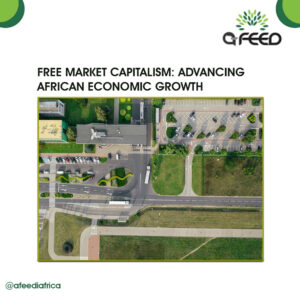FREE MARKET CAPITALISM: ADVANCING AFRICAN ECONOMIC GROWTH
In the 2021 Index of Economic Freedom, Mauritius (rank 11), Seychelles (rank 43) and Botswana (rank 45) were the top African countries that created policies that supported private institutions and economic independence.

The major features of their economy are property rights and financial freedom. Expectedly, these countries are advancing economic autonomy as they provide opportunities, supporting innovation and productivity for sustainable economic development.
On the contrary, larger African societies experienced a drawback. Even the giant of Africa – Nigeria was a mid-ranker, taking the 105th position in the 2021 Index.
Poor economic decisions have costly consequences. Hence, there is a need for African countries to adopt a free market capitalism system to prevent long-term economic hazard.
What is Free Market Capitalism?
Free market capitalism is an economic system based on supply and demand with little or no government interference. They are characterized by a spontaneous and decentralized order of arrangements through which individuals make economic decisions.
Free Market Capitalism and Economic Growth
It is evident from numerous data that countries around the globe that adopted economic policies that promote free markets have witnessed a high growth in the quality of life of their people; this should be the goal of every African country, especially in a democratic society like Nigeria.
Income Mobility
Income mobility is a feature of the free market which describes how an individual’s economic condition changes over time. In Nigeria, there’s income inequality in the distribution of wealth and this has significantly contributed to poverty in the country. The National Bureau of Statistics (NBS) reports that 40 percent of the total population, or almost 83 million people, live below the country’s poverty line of 137,430 naira ($381.75) per year. Adopting Free market capitalism would help provide opportunities; allowing the citizens to grow and improve their quality of living.
Competition
In a free market, government restrictions on trade are minimal and only necessary laws are enforced. This consequently removes the barrier to entry. Increased competition improves a country’s performance, opens business opportunities to its citizens and reduces the cost of goods and services throughout the economy.
Incentive to Innovate
When there’s competition, businesses and individuals are motivated to do better and surpass competitors in order to stay in business. This leads to innovation and differentiation in products and services in the market.
Free market capitalism also helps to control inflation as regards the cost of producing and selling goods, thereby contributing to economic growth of the country.
“The African Continental Free Trade Area has the potential to increase employment opportunities and incomes, helping to expand opportunities for all Africans. The AfCFTA is expected to lift around 68 million people out of moderate poverty and make African countries more competitive. But successful implementation will be key, including careful monitoring of impacts on all workers—women and men, skilled and unskilled—across all countries and sectors, ensuring the agreement’s full benefit.”
Albert Zeufack, Chief Economist, Africa
At AFEEDi, we believe that entrepreneurship and a better society is achievable when there is limited government control and equal participation in the capital market. Capital takes the path of least resistance, so the sooner Africa can embrace the free market system and lower the barriers to trade and investments, the faster the rate of her economic growth.
